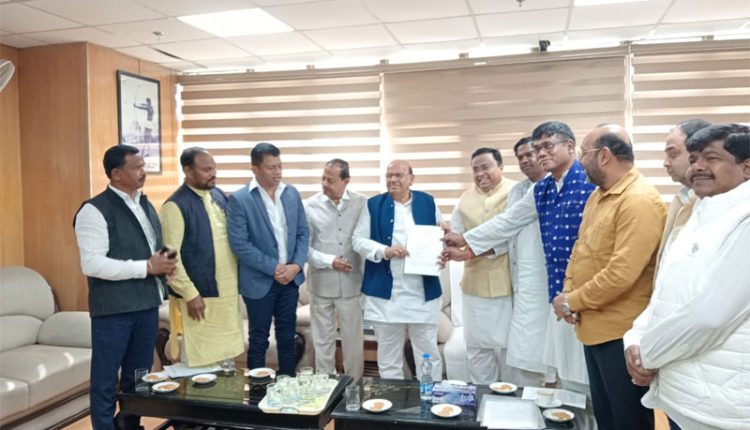Bhubaneswar, 04/12/2024: BJD Delegation led by Shri Debi Mishra along with BJD MPs of Rajya Sabha, MLAs, Ex Ministers of Govt of Odisha, Ex MPs, EX MLAs from the Malkangiri and Koraput Region with the direction of Shri Naveen Patnaik President BJD met Shri Antar Singh Arya, Chairperson, National Commission for Scheduled Tribes at 02.00 PM at Lok Nayak Bhawan, New Delhi, Mrs Leena Nandan, Honourable Secretary, Union Ministry of Environment, Forest and Climate Change at 12.00 PM at Indira Prayavaran Bhawan, New Delhi, today met higher officials of the Ministry of Tribal Affairs Government of India at 11.00 AM at Shastri Bhawan, New Delhi.
The Government of India’s recent sanction of Rs. 15,000 crores in the 2024-25 budget for the completion of the Polavaram Project has escalated the concerns of Odisha, as it impacts the land, livelihood, and safety of our local communities most of whom are tribals. This project was conceived under the resolution of the Godavari Water Dispute Tribunal (GWDT), which outlined agreements between Andhra Pradesh, Odisha, and Madhya Pradesh. However, significant changes have been made to the original design flood discharge capacity, increasing the flood discharge from 36 lakh cusecs to 50 lakh cusecs, without sufficient consideration of the backwater impact in the upstream states of Odisha and Chhattisgarh. This shift has caused apprehensions among the affected populations of Malkangiri, who are at the risk of losing their lands and homes.

The Polavaram Project was initially designed based on a Godavari Water Dispute Tribunal (GWDT) resolution involving Andhra Pradesh, Odisha, and Madhya Pradesh. The project was originally intended for a flood discharge of 36 lakh cusecs with a backwater submergence of up to 174 feet. However, the project has since been revised to accommodate a flood discharge capacity of 50 lakh cusecs, a change that has not been adequately studied for backwater effects in the upstream states of Odisha, Chhattisgarh, and Telangana.
In the absence of adequate backwater studies and following a Supreme Court order (2022), which suggested that the Central Water Commission (CWC) lead discussions, it is apparent that Odisha has been ignored in the planning process. The primary concerns relate to the displacement of thousands of tribal people from Malkangiri District, who will lose their land and livelihood due to the submergence caused by the Polavaram Project.
Key Issues and Concerns of Odisha
Design Flood and Backwater Studies
Flood Discharge Capacity: The initial design flood of 36 lakh cusecs was later changed to 50 lakh cusecs. The backwater submergence due to this increased discharge capacity has not been adequately studied, especially in the upstream regions of Odisha, where significant areas are at risk of submergence.
Inconsistencies in Backwater Computations: Multiple agencies, including the CWC, the Government of Andhra Pradesh (GoAP), and IIT Roorkee, have provided conflicting estimates of the backwater levels, ranging from 174.22 feet to 232.28 feet, which further exacerbates the uncertainty regarding the extent of submergence in Odisha. These discrepancies make it impossible to accurately assess the full impact on the region.
Impact on Tribal Communities in Malkangiri District
The tribes in Malkangiri, especially the primitive tribes, are highly vulnerable to the submergence caused by the Polavaram Project. The flooding of their ancestral lands will result in loss of habitat, culture, and livelihood.
Despite this, the state of Odisha has not been consulted adequately on the environmental, social, and livelihood impacts on the tribal communities. The lack of a comprehensive and transparent assessment of the impact on vulnerable populations is a major concern.
The various tribal Communities in Malkangiri District of Odisha that are going to be affected are Koya, Bhumia, Paraja, Matya, Gadaba, Kandha, Bonda, Kotia, Banjara, Bhuyan, Kondadora, Bhottoda, Kandha Gauda, Parenga etc.

Lack of Public Consultation and Transparency
Environmental and Forest Clearance: The environmental clearances granted for the Polavaram Project were based on the assumption that no submergence would occur in Odisha. These clearances were given without proper public hearings in Odisha and without conducting detailed backwater studies for the updated flood discharge capacity.
Compensation and Rehabilitation (R&R): The Government of Odisha has repeatedly raised concerns regarding the adequacy of the R&R plans for the affected tribal communities. The current plans do not address the socio-economic impact of submergence in the Malkangiri region.
Odisha has consistently appealed to the Supreme Court to direct the authorities to conduct fresh backwater studies considering the worst-case flood scenario. However, these appeals have been largely ignored or sidelined in favor of proceeding with the project without fully addressing the concerns of Odisha.
Shri Debi Prasad Mishra, Ex-Cabinet Minister, Government of Odisha, Dr. Sasmit Patra, Honourable MP, Rajya SabhaShri Niranjan Bishi, Honourable MP Shri Ramesh Chandra Majhi, Ex-Minister, Government of Odisha, Shri Pradeep Majhi, Ex-MP, Lok Sabha, Shri Manohar Randhari, MLA, Odisha Legislative Assembly, Dr.Priyabrata Majhi, Media Coordinator, Biju Janata Dal, Shri Bhrugu Bauxipatra, Spokesperson, Biju Janata Dal, Shri Manas Madakami, Ex-MLA, Odisha Legislative Assembly were present in the meeting.

